Have you noticed weight gain after your thyroid was removed?
If so, you are not alone.
In fact, studies show (1) that, on average, women gain 20 pounds after thyroid removal.
This begs the question:
Why does this happen and is there anything you can do about it?
The answer is absolutely.
But in order to understand how to fix the problem, you need to understand why it occurs:
Reason #1. Thyroid Hormones Regulate Metabolism
The real reason that women gain weight once their thyroid has been removed is actually quite simple:
Thyroid hormone regulates metabolism.
And if you don’t put in the same amount of thyroid hormone that you took out, you’re going to gain weight.
How do we know this?
Because one of the first and biggest complaints of people with low thyroid function is weight gain.
In fact, it’s the #1 most endorsed symptom by women with low thyroid function.
But here’s the great irony of the situation:
If we know that low thyroid function causes weight gain and women with their thyroid removed experience this very symptom, shouldn’t that say something about their thyroid function?
You would think so, but if you were to ask your doctor this very question they would tell you that this weight gain can’t possibly be related to the thyroid if the TSH is normal.
How can this weight gain be explained then? They don’t have a good answer, but I do.
Thyroid patients who maintain a regular weight after thyroid removal are the patients who take thyroid medication that more closely mimics the thyroid production of the healthy thyroid gland.
If you are like most people without a thyroid then you are only taking 1 thyroid hormone and that’s T4 from levothyroxine.
But the healthy thyroid gland creates 4 different thyroid hormones, 3 of which perform different functions and actions.
Reason #2. Many Thyroidectomy Patients Are Not Taking Enough Thyroid Medication
The majority of patients who have had their thyroid removed struggle because they are being undertreated.
What do I mean?
I’m talking specifically about your thyroid medication dose.
The prescription medication that you were given once your thyroid was removed.
EVERYONE who has their thyroid removed will need to be on thyroid medication for the rest of their life.
It’s not an option because thyroid hormone is required to sustain critical functions in the body.
This is not up for debate.
But what is up for debate is how MUCH of that prescription thyroid medication you are taking (and what type of medication you are taking).
This is referred to as your dose.
And most thyroid patients, including those without a thyroid, are taking a dose that is too small for their bodies.
This occurs frequently because most doctors dose based on a test known as the TSH.
In addition, they almost always use the weakest form of thyroid medication levothyroxine and Synthroid.
These two reasons account for why most patients without a thyroid are not receiving the right dose.

And, obviously, if your dose is inadequate then you will have trouble with your weight.
Remember when I said that your thyroid controls and regulates your metabolism?
Once your thyroid has been removed you are now counting on your prescription medication to take its place.
And if you are not replacing it adequately you will continually gain weight and/or have difficulty losing weight (usually both).
Reason #3. Many Thyroidectomy Patients Are Not Taking The Strongest Thyroid Hormones
Are you currently taking levothyroxine or Synthroid?
If so, you are like most other thyroid patients.
These medications are the go-to medications for most endocrinologists and other thyroid doctors.
But there’s one big problem:
Your thyroid gland, when it’s functioning in your body, produces TWO types of hormones.
But when your thyroid gets removed your doctor almost always will put you on only ONE type of thyroid hormone.
T4.
The medications I mentioned above, levothyroxine and Synthroid, contain only T4 thyroid hormone.
We know that this is a problem because studies have shown that patients who use only T4 medications like levothyroxine never obtain normal healthy free T3 levels after thyroid surgery.
How can you consider someone to be adequately treated if you do not at least try to mimic the same hormone production that a healthy thyroid gland produces?
And yet this is exactly what most endocrinologists do.
The healthy thyroid gland produces roughly 80% T4 and 20% T3 thyroid hormone (3).
But when your thyroid gets removed your doctor puts you on 100% T4 thyroid hormone and neglects to add in the T3.
This is a big problem because T3 thyroid hormone is 3-4 times more powerful than T4 thyroid hormone.
Once your thyroid has been removed you are losing the benefit of 20% of the strongest thyroid hormone in your body and replacing it with an extra 20% of a weaker version.
With this change in thyroid hormone metabolism, it’s no wonder that thyroidectomy patients struggle with weight gain.
Reason #4. An Undertreated Thyroid Leads To Other Hormone Imbalances
And lastly, another reason that women without a thyroid suffer from weight loss resistance is caused by other hormone imbalances.
While your thyroid definitely contributes to your overall metabolism, there are other hormones that are regulated by your thyroid that contribute to your weight in other ways.
For instance, the fat hormone leptin is involved in regulating appetite and metabolism and it is intertwined with thyroid function.
If you have your thyroid removed and you do not replace your thyroid levels adequately, it sets the stage for the development of a condition known as leptin resistance.
This condition is created by the environment of low thyroid hormone but it is not FIXED by simply taking thyroid medication.
And leptin isn’t the only hormone that is, in part, regulated by your thyroid.
Another fat-storing hormone that is, in part, regulated by thyroid hormone is insulin.
Women without a thyroid tend to develop insulin resistance and leptin resistance over time if their thyroid is not treated adequately.
These hormone imbalances make weight loss even more difficult and MUST be addressed if you want to lose weight long-term.
Is Weight Loss Impossible After Thyroidectomy?
So here’s where we are at:
Patients without a thyroid are often undertreated or treated with the wrong types of thyroid hormones which leads to a slower than normal metabolism.
This slower metabolism promotes weight gain.
This extra weight (along with the incorrect thyroid hormone treatment) promotes hormone imbalances like insulin resistance and leptin resistance which further promote weight gain.
And the cycle continues until its broken.
Is there a solution?
Yes.
But you should be aware that your weight loss journey will be much slower than people who have a thyroid.
That’s just the unfortunate situation that you are now in once your thyroid is gone.
I usually tell people without a thyroid to expect weight loss at about a rate of 50% compared to people with a thyroid.
They will also have to try about twice as hard as the average person.
Yes, it’s slow, and yes it’s hard, but it’s not impossible.
Another thing that you should know is that your thyroid medication is going to be a very important part of your weight loss journey.
Because your thyroid can no longer produce thyroid hormone on its own, you will need to pay close attention to what type of thyroid medication you are using and how much you are using.
Your goal here should be to try and mimic whatever production of thyroid hormone your thyroid was producing BEFORE it was taken out.
This will almost always include a combination of T4 and T3.
If you aren’t familiar with T3 thyroid medications then I would recommend you look at both Cytomel and liothyronine.
These are prescription medications that contain the T3 thyroid hormone and can be added to your existing dose of levothyroxine or Synthroid.
You can also get T3 thyroid hormone from other thyroid medications such as Armour thyroid or other formulations of NDT.
Either source will work but make sure you do NOT neglect this step!
Do Supplements, Diet, and other therapies Work?
Assuming your thyroid medication has been optimized your next step will be to get aggressive with additional therapies.
This means you will absolutely need to look directly at the types of foods that you are eating, the types of supplements you are taking, and how much you are exercising.
Remember:
You will need to work twice as hard to lose weight compared to someone who has a thyroid.
This usually means that having cheat days from your healthy diet, at least in the beginning, is not really an option for you.
It certainly isn’t fair but it’s better to know that this is the case than to not.
When I talk about diet, I’m really talking about healthy eating.
You want to avoid any type of diet which is considered a “calorie-restricted diet” as these types of diets will make thyroid function worse.
Instead, focus on diets that include healthy whole foods such as the paleo diet, whole30, or any other version such as that.
I would also recommend that you look into supplements designed to help thyroid hormones do their job, supplements that can help with weight loss directly, and supplements that help manage food cravings.
These should ALL be done in conjunction with adjusting your diet (as mentioned above).
Do not make the mistake of thinking that taking a couple of supplements will help you lose weight because that is not the case.
Your Turn
While weight loss can be very difficult and frustrating once your thyroid has been removed it is definitely not impossible.
I have personally helped many patients without a thyroid lose weight and, at the very least, start to feel like themselves again.
But I am speaking from experience when I say that the weight loss they experience is much slower when compared to people with a thyroid.
Understanding this phenomenon will help you manage your expectations and prevent you from getting discouraged when you start your weight loss journey.
Now I want to hear from you:
Did you gain weight once your thyroid was removed?
If so, how much did you gain?
Are you trying to lose weight right now?
What types of therapies have you tried? What has worked? What hasn’t?
Leave your questions and comments below!
Scientific References
#1. https://www.ncbi.nlm.nih.gov/pmc/articles/PMC3229816/
#2. https://pubmed.ncbi.nlm.nih.gov/24692351/
#3. https://www.ncbi.nlm.nih.gov/books/NBK499850/
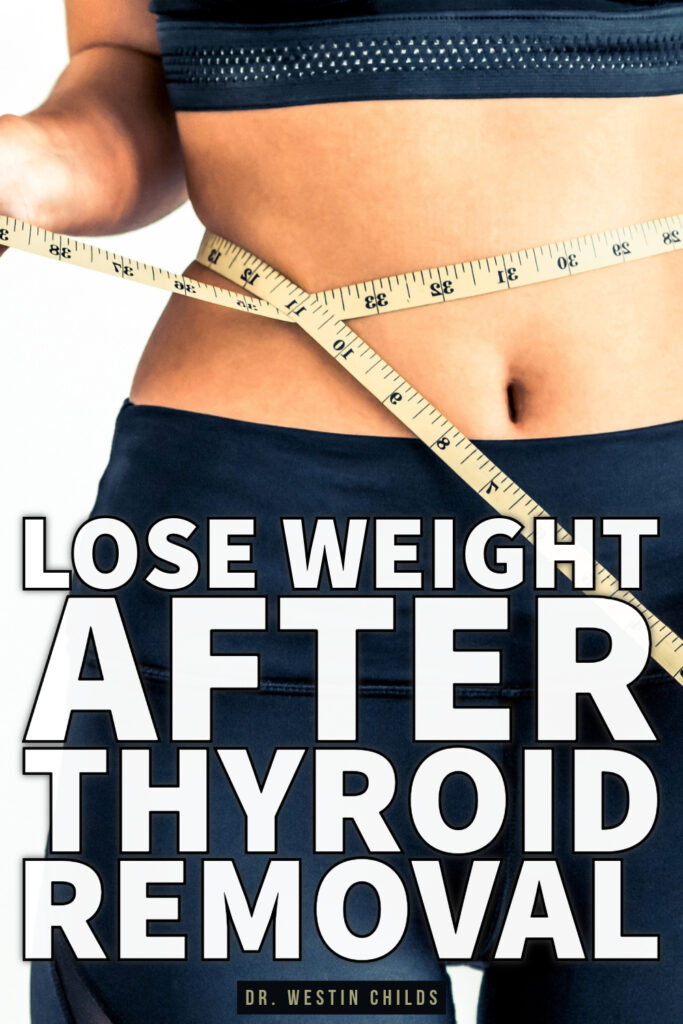
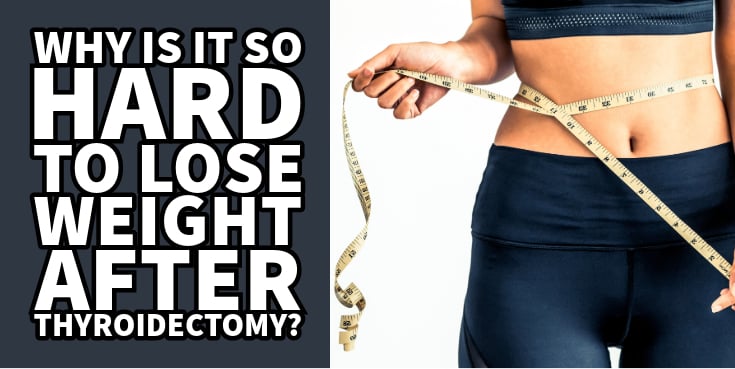
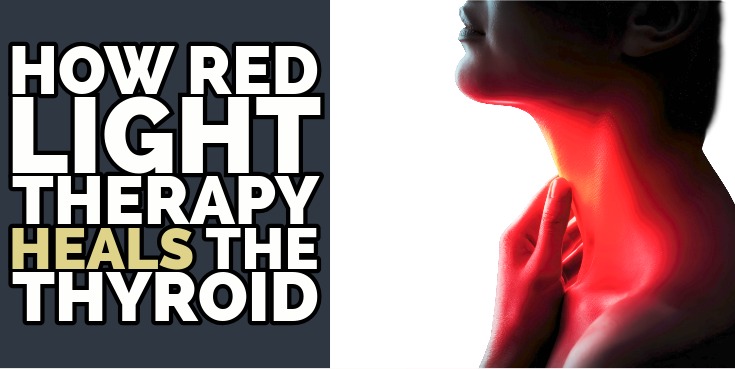
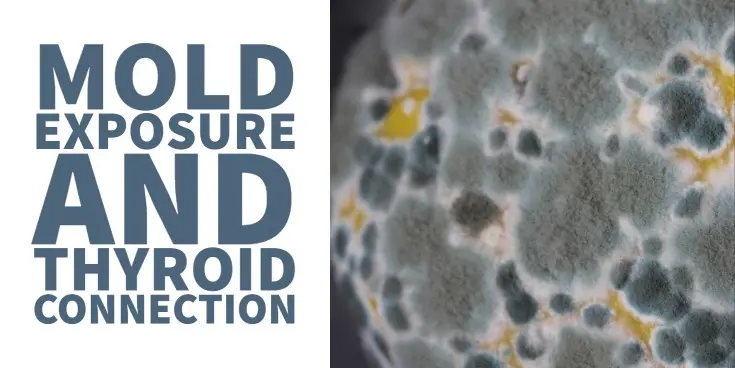



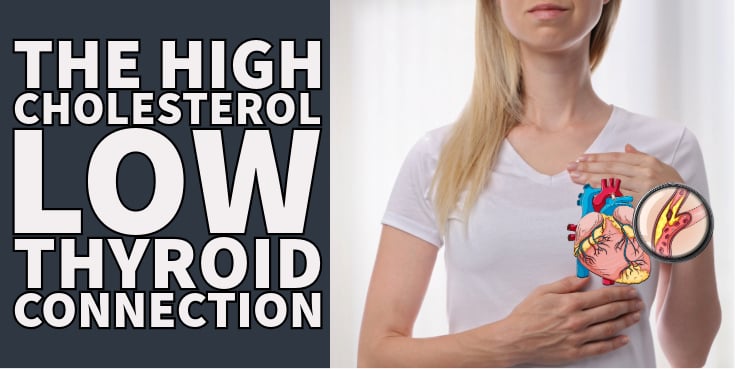

I had my thyroid out in Oct 2016. Since then I have gained at least 40 lbs. 8 months after my surgery my TSH was 29. My worthless doctor only did labs once between that time. I didn’t know better. But I knew not being able to get out of bed was a problem…I have struggled to get my levels in “normal” range. I switched to Armour but no matter how high the dose my body was just not absorbing it. It was weird. I’m back on levothyroxine and finally after 3.5 years it’s getting better. But in the meantime I have put on all this weight, more than ever in my whole life. And I haven’t changed my eating habits. I’m hoping to see some others suggestions of what they have done to help the situation.
I had a doctor who didn’t believe in labs for dosing thyroid meds. He based it on how you feel. But when I went in and told him something is wrong cuz I’m gaining weight rapidly (which want normal), he did exactly what Dr. Childs said he would. He blamed it on my eating habits. I’m keeping this short or I’ll we’ve up going off on a tangent.
Moral: BP bouncing around 90/60, temperature in middle of July 94.8 (and i live in the desert), weight gain 100 pounds, heart rate 20-30 beats below my norm, labs drawn for physical TSH 59 (and yes that is really 59, not 5.9), began having narcoleptic episodes (falling asleep without knowing i was until I woke and realized unaccountable time had passed.
I was only receiving about 60 to 65% of what my body required at minimum. This was my level of meds for over a year. I have had thyroidectomy and high dose RAI. The amount of damage my body has endured from his gross negligence is yet to be completely discovered. My cholesterol was high for the first time in my life. The weight is not coming off at all. Doctors here do not like being told how to do their job and could care less if you spent endless hours researching and learning all you can.
I wish you the best and hope you lose what makes you feel comfortable. I feel like I’m stuck in a Halloween costume that I cannot get off no matter where
How horrible!
You hit the nail on the damn head, Dr. Childs. Thank you for this post. I’m sorta fired up right now because I have spent the last 6 weeks reading every blog post and studying my tail off to try and get to the bottom of why I feel so awful and have gone from 130 lbs to 180. I had the TT 6 years ago and was fine for 2 years. Then BOOM. I blew up 30 lbs in 2 months. The rest of the gain has been slowly over time.
I’ve been taking NDT. I’ve been working with not just one but 3 of “the best” functional MD’s in LA, whom I trusted to take care of my lack-of-a-thyroid condition. I’ve been eating 80-90% paleo for 5 years, I work out, get 10k steps, do power yoga and strength training and HIIT. I keep my stress in check and I sleep 7-9 hours.
And for the past 4 years the docs keep saying, “you’re doing everything right”. I’ve done all the GI tests, SIBO, mold, urine hormones, saliva tests, like all of it.
Every single doc for the past 4 years has said its insulin resistance. So finally, I bought myself a keto mojo meter and did the keto diet for 3.5 weeks. I completely reversed any sign of insulin resistance in my labs — and gained 4 lbs in the process.
Then finally after I insisted for the 50th time that my labs were not optimal, I need more medication. The doc added 10 mcg of Cytomel to my usual 4 grain NDT dose (which I still don’t think is right). Its been about 1.5 wee and I have lost 6 lbs. I think I should be on 6 grains, but 5 would be the right place to start. I don’t know why, I have always needed a really high dose.
I am still very hypo tho. Body temp is between 95.6-96.8, I can’t keep my eyes open past 2 pm and I keep getting dumb blonde jokes because the brain fog is so bad. My BFF has started calling me Rose Nylund (from the golden girls). And I’m normally a sharp snappy person.
I have been watching the past 4 years of my life blow by me because I am too tired to move. I can barely handle working anymore because I can’t do a full day. I’m so frustrated. because I know in my gut that it doesn’t have to be this way. If someone would just please pay attention.
What does it take to get even a highly respected functional MDs to listen to a patient?
TSH 0.06
FT4 1.3
FT3 3.2
RT3 13
SHBG 140 – H
estrogen 287.7
estradiol 30
progesterone 5.2 (taking bio-identical pills 100mg)
testosterone 29
free testosterone 1.0
IGF-1 137
cortisol 10.7
DHEA 121
leptin 5.7
Fast glucose 80
insulin 5.8
hb1ac 4.8
HS CRP .9
Ferritin 59
I have hemochromatosis (2 genes) and both variants of MTHFR)
Hi Fini; your medical situation sounds very much like mine. Except I quit NDT and T4 because it was only producing RT3 and ruining my life. Have you check your ratio: http://www.restartmed.com/free-t3-reverse-t3-ratio ?
Hi S,
I wish I had seen your comment when it was posted. Sorry for the massive delay…
So you have had a thyroidectomy and you take no T4 at all? That is surprising to me, because don’t you want some gas in the tank?
(I take a combo of t4 and t3)
And yes, I have checked the ratio, but its sort of a moving target with the t3 having such a short shelf life. within 8 hours you could have very different levels (which is why I take my t3 twice daily instead of one big dose).
Love to hear more about what is working for you!
Just wanted to share something else I just learned about. I had never heard of this before. But in my most recent meeting with my doc, I asked, “so do I have a conversion problem?” He said, “no, it is not conversion exactly but your hormone receptors are not functioning properly”.
So I google “Thyroid hormone receptor resistance” and mostly get medical studies which are hard for me to read with no medical training. Maybe a gene mutation? or maybe have other causes too.
The issue I am having is that my dose of meds has always been high. Before I had a TT and weighed 130 lbs I was on 4 grains NDT.
Now that I am 180, I really think my dose should be 5 grains, maybe even 6. Which sounds scary high. But the doctors are afraid to go higher.
Doctors say: you have to be careful of your heart and osteoporosis. But I’ve have no hyper symptoms on really high doses, I have tested it. No palpitations or anything other than feeling great and like my old self.
I read a number of studies and it seems that people with this resistance tend to do fine on higher doses and also tend to have very suppressed tsh, which I always do, no matter my dose.
I’m wondering if you have any information / advisement to share on this topic?
Same again with this issue. Dr
Childs, are you please able to share your thoughts on Resistant to Thyroid Hormone (RTH)? Wondering if it could be related to mutations like Fini mentioned (I have the double MTHFR gene, too) and CYP2D6 rapid metaboliser gene, too. Feels like the thyroidectomy was a “Game Over” to living any sort of fucnctional life
I just want to say, I know how you feel. I read about people who get palpitations and jittery from Cytomel. In have been on 25 mcg in the past and never felt that way. At least, your doctors do all those tests. I know about them but can’t get them to run them. The last doctor I tried in this town tested TSH, T4, Thyroglobulin& Thyroglobulin Antibodies. His nurse calls and says my T4 is hi (it was the higher end of normal) and he wants to lower it. I said no way. I am getting a second opinion. He didn’t even test my T3 to see if I was having conversion issues and I can’t find anyone to run an rT3 or any other informative test. I pay for my health care and carry an excellent plan so I have the problem that docs don’t want to learn, and they won’t test what they don’t know. I’m so desperate that I reached out to a doctor 4 hours from where I live.
Bridget, sounds like we’re in the same crappy boat, dear. I’m sorry you are experiencing this, it sucks.
I split my doses of t3 into 2 doses to avoid bombing my system all at once. I take 1/2 when I wake up and then again around 11 am. (My functional MD advises this type of dosing.) T3 has a shelf life of about 8 hours, peaking at 5 hours. So this is really important timing to incorporate into your lab draws as well.
when I do my labs, I have to go to the lab 2x in the same day. 1 fasting no meds at 7 am when they open, then I take my meds right after the draw, and return 5 hours later (still fasting) to see what my t3 is at the peak vs what it is on valley.
This way, I am able to validate with stupid endo’s & GP’s that I am not overmedicated. (They always want to change my medication)
I am I went through the same problem my thyroid was cancerous and was removed when I was 39 that was 13 years ago the weight came on in the last seven years I keep talking to my doctor and because of my blood level he keeps lowering my T4 however my GYN who is unbelievable put me on T3 about 4 months ago I’m just wondering what dose of t3 you’re on. I was told exactly the same thing regarding T4 and T3 levels, I even tried a diet pill prescribed by a doctor and that’s just temporary I’m in the process now trying to change my diet but it’s so discouraging.
Hi Linda,
I would recommend reading this article about the difference between T4 and T3 levels in those with a thyroid versus those without: https://www.restartmed.com/levothyroxine-thyroidectomy-patients/
I literally am the same as you 130 pounds at 24 years old in 2019 had thyroid removed now 2025 in the 180s. I’ve had 2 pregnancys and was going down got to 150 after my first I was so happy then bam pregnant again and been 180 sense giving birth 8 months ago. I am not eating very much. Idk what to do. I’m on 150 mcg of synthroid I stopped levo cause I wanted the brand name but it doesn’t seem to help me loose weight. Any tips on what I can ask my doctor to help?
I just started Armour 30mg this past April, recently increased to 60mg. I’ve noticed that I’ve started gaining weight more rapidly. 3 pounds a day. Can Armour cause weight gain?
Hi Tiffany,
I’ve seen people gain weight with just about every thyroid medication you can think of, including Armour thyroid. The cause of the weight gain is not always directly related to the thyroid medication, though.
Did you gain weight once your thyroid was removed? Yes
If so, how much did you gain? 40+ lbs
Are you trying to lose weight right now? Yes
What types of therapies have you tried? What has worked? What hasn’t? Plant-based – no but also recently diagnosed with Crohns. Interment fasting 18/6 – not really. Juicing – yes. Feel the best. Try to do it every day but eat a clean meal each day. Did you gain weight once your thyroid was removed?
Was on T3 compound only for over a yr. think this caused fatty liver issues. Body needs T4. Now on T3/T4 combination – 85/155. I walk 5 miles 3X week and do weights 1 to 2x a week
If so, how much did you gain?
Are you trying to lose weight right now?
What types of therapies have you tried? What has worked? What hasn’t?
Yes I gained 40 lbs after TT.
Keto helped me lose 15 but I haven’t been able to maintain the diet.
I take T3 after begging doc but she only gives me the lowest dose. I still usually lose all energy by 2:00pm.
I am 66 and 8 years post TT.
No doctors care about how I feel physically or emotionally.
Hello. I had a thyroidectomy in 2006 and have steadily gained roughly 35-40 lbs since. I’ve tried several different changes to my diet and I exercise 5 days a week (not overdoing it) and haven’t lost a pound. Just keep gaining. I’ve tried different supplements for leptin resistance and vitamin deficiencies but that didn’t help. I’ve tried adding cytomel to the NDT I’m on and that didn’t help either.
Jennifer, I lost my thyroid functions from 48-weeks of chemotherapy for hepatitis-c in 2001-2002. My doc tried synthroid and levothyroxine which both caused severe depression. I asked for Armour Thyroid Brand and am taking 75mg/daily on an empty stomach. I gained 100 lbs within a very short time and just the last three months am doing the Code Red Lifestyle and have lost 50 lbs. My weight loss is slow but I am hopeful. Try the CodeRed.com It’s $47/mo. But there’s a lot of support, Information and Education. The Code Red “Lifestyle” is: drink 1-gallon of water a day, weigh self every a.m./naked/sleep 7 or more hours a day. Eat meat, (any kind), all veggies, NO STARCHES (no legumes, potatoes, yams, rice, pasta, bread NO GRAINY whatsoever! No alcohol! No peanuts. Only pecans, walnuts, macadamias, cashews. Fruit are berries only! No pears, Apples, citrus. You eat when hungry, STOP when full. Two meals a day, NO SNACKING. And last meal by 6:30 p.m./latest. It’s a good program for me with no thyroid function!!
Did you gain weight once your thyroid was removed & If so, how much did you gain?
– yes 30 lbs, I was an athlete In my early adulthood and remain active, currently 41 years old. I have weighed between 143-153 lbs my entire adult life with the exception of my two pregnancies both of which I topped out at 180 lbs. This year I had two surgeries, the first removing half of my thyroid and then a completion thyroidectomy due to pathology results. Within 6 weeks of the second surgery I weighed 176lbs.
Are you trying to lose weight right now?
– yes, I have been watching what I eat keeping my caloric balance for the day between 1000-1500 calories. I have read your blog posts about caloric restriction and reverse T3 production. I wanted to ask if this is caloric balance for example I consume 2000 cal in food and exercise 1000 calories, resulting in a caloric balance of 1000 calories or simply calories consumed. I always eat a minimum of 1200 calories but sometimes the calories expended in exercise have resulted in a caloric balance of between 800-1000 calories. Prior to having my thyroid removed I could easily eat 2500-3000 calories a day and not gain weight and would have easily dropped weight with my current level exercise and attention to diet, however I have struggled to lose even 5 lbs over the last 6 weeks.
What types of therapies have you tried? What has worked? What hasn’t?
I am on 125mg of synthroid daily which I take at 5:30 am and usually do not eat breakfast until 8:30-9:00.
I eat Brazil nuts for selenium, supplement with greens and berries, omega 3, Vitamin D, B vitamin complex, Multi vitamin and iron (due to low ferritin on my last blood test). I also take vitamin B2, Magnesium and CoEnzyme 10 for migraines.
I am on low dose birth control to control hormonal issues such as acne, irregular and excessively heavy cycles. I am also using seed cycling to try a natural method. As well as 75mg of Effexor for anxiety that was aggravated due to my diagnosis, specifically the inability to control the feeling that my heart is racing.
I exercise regularly including yoga, cycling and running. Most days I expend 700 calories in exercise.
My endocrinologist is switching my prescription to a synthroid/cytomel combination next week.
Hello, had a TT exactly one year ago, have gained 30lb. Asked dr to change over to NP,60 mg, then just had tsh checked, and is 22! AND just heard of the NP recall, and yes the mfg company was Acella for my meds. Diet includes mostly paleo and glutten free. And just like the previous notes from others, my dr trying to blame it on other stuff. Very frustrated.. NEVER weighed this much and photographs at daughters wedding from 2 weeks ago SHOW every ounce. I want to cry! According to your info, exercise will not help until my levels are optimal, What can i do?
Hi,
I had a thyroidectomy 14 years ago. I have gained 50 pounds. Have also had alot of trouble with dizziness, fatigue, and depression. Have been to multiple doctors who will not increase my thyroid medications (I take synthroid and cytomel), but will always try to increase my depression medications. They blame everything on diet/exercise, but I do both! Very Frustrating! Your post has at least given me an answer!
Severely depressed from the 100 pound weight gain over 5 years. I am preparing for a gastric sleeve. I feel helpless. I am currently taking no thyroid but I continue to gain weight. I had my thyroid removed after thyroid storm Hyper.
I didn’t really gain any weight after my thyroidectomy, I actually lost weight. I was on Synthroid for 4 years which kept me very very I’ll. Finally found a primary care physician who believes in NDT. So I started on Nature Throid. I really lost the weight then without trying. It just melted off. After 4 years on Nature Throid it’s now recalled. I started on NP Thyroid & after one dose adjustment I feel good. I have gained 12 pounds over the last 14 months though but even though I have my walking routine & eat alot of organic vegetables & fruits, etc. I haven’t eaten as clean as I could have. But, I’ve started back being careful of what I’m eating & hoping to lose 15 pounds & drop back down to the pant size I was 14 months ago. Thyroid patients should not be fasting or doing low carb keto diets. We need healthy complex carbs each day. Too much & to vigorous exercise will have the opposite effect on trying to lose weight. I’m hoping NDT thyroid medication will never go away because it really positively changed my life for the better where I can function again. I still get easily fatigued though if I do to much so I have to be careful & work hard to stay balanced & manage stress.
So do you think you gained weight with NP thyroid medication change, stephanie? It sounds like nature throid was working for you, and when the recall happened, you switched and gained?
there have been many recalls on NP thyroid too.
Your post has confirmed my circumstances. I had half my thyroid removed 6 years ago and actually lost weight because I was so sick with Hashimoto’s prior to the surgery. I had a lot of energy afterwards. I have tried to maintain a gluten free diet as well. Any time I have tried to limit my calories, I have had very little success and felt very tired. Two pounds in 4 months of dieting is discouraging! I started gaining a pound here and there in the last year after my Dr. removed my cytomel prescription. My first endocrinologist mentioned she felt I had a conversion problem. My present endocrinologist does not want to prescribe cytomel. I have two brothers that were recently diagnosed with AFib and he feels cytomel is risky to my heart if AFib runs in the family. Any comment on that?
Hi Mary,
Even if it were to cause afib, which wouldn’t be likely, you could simply stop taking it and you’d be fine. A fib is typically caused by other issues such as weight gain and the issues that come along with it, so that’s far more concerning than the thyroid medication you’d be using to try and help reverse those conditions.
Total thyroidectomy 10 years ago, weight gain of about 20 kg since. No luck with diets, have tried low carb for the last 4 years and gained more weight. One endo told me I won’t lose weight because I am compromised – my age (60 now) and no thyroid. He told me that even if I lived on diet shakes I would not lose weight. Now I have found myself a good doctor who suggested time restricted eating (she said that is how she stays slim). So over the past 3 months I have eaten breakfast at 8am, dinner at middle of day and tea at 5 pm and nothing in between except water and black coffee. And I have lost 10kg. It is slow going but it is going and I am thrilled. It is an easy way of eating, I can do it without counting calories or following confusing rules and I can do this for life. If I want chocolate I eat it. If I’m meeting a friend for coffee and cake, I skip breakfast and still have the cake. I hope this helps others like me.
Prior to my thyroidectomy I was in the fitness field.
I had a thyroidectomy in 2016 (cancer) I started out taking only T4 (Synthroid) and my mood swings and weight gain (20+ lbs) the first 2 months was terrible along with a collection of joint pains in my feet, calves, knees and hips that made walking or standing unbearable.
The expected weight gain of 20 pounds is a freaking joke and each person’s reaction to surgery and treatment and prior health issues will certainly be a bigger prediction of the weight gain (menopause) +(thyroidectomy) + (improperly medicated)+ (prior health issues) = MASSIVE opportunity to gain more then over the 20 pounds these dummies predict!
Anyway, I did bring the weight gain and mood swings up multiple times with my 1st Endo telling him that my weight gain won’t stop he suggested “weight loss shakes” he use to be a diet doctor THE HORROR of that comment made me realize I MADE A HUGE MISTAKE in doing this surgery and this Endo was a lunatic (I did fire him) but it was too late in my opinion he set the stage for the past 4 years that I just can’t seem to get off of now.
I do take a combo of T4/T3 now for almost 2 years and Im far from being normal and honestly don’t think normal is a word I can ever use to describe me again.
My recommendation: Pay attention to your labs and speak up if your not feeling right and fire any Endo that doesn’t meet your standards of care and please seek out 2nd and 3rd opinion before you consider doing a thyroidectomy even if they say “cancer” and remember all magic comes with a price.
Hello, I had a Thyroidectomy in 2003 due to cancer. Been on synthesis since. Was on Cytomel for a month after and doctor took me off said I didn’t need it. In all these years since my surgery they have never once tested my T3 levels, though I’ve asked many times. I’ve complained so many times about the weight gain and they always say the same thing ” eat less and exercise more”. I believe I’m definitely in the leptin resistance stage, anything over 500 calories sticks to my body. I walk 6-8 miles a day and do some weight resistance and no weight loss. It’s very frustrating when your endo doesn’t listen to you and how you feel. They believe they know how you feel.
TT in 2005. I’ve always had a minor weight problem, and losing my T-gland certainly didn’t help. I’ve been working w my functional med primary care physician to get my reverse-t3 down from 36 to 17 currently, w a target of 12. I am on Levoxyl 75mcg and 20 mg of Cytomel daily. I can lose weight for a period of time then it slows down and I end up going up to 220 pounds again.
Fifteen years is a long time. It takes so much effort to convince myself that it’s my BODY and not ME that is fat. Ugh.
My doctor works with me, but it mostly concerned about TSH because of the osteoporosis risk… is she right?
Hi Liz,
Sort of but not really. You can learn more here: https://www.restartmed.com/suppressed-tsh/
I am 75 years old and had my cancerous thyroid removed 23 years ago. I have gone from 145 to 209. I have constantly had challenges with my levels. For years I was on 75 Levoxyl and 30 Armour. Through a series of many events I am currently on 105 Armour and no Levoxyl. I has always through this entire journey been exhausted in the morning and no doctor cares. Now that I’m on just Armour it is worse. My tsh levels went from .8 to 3.29 and the endo didn’t thing this was such a huge jump. Seriously. I’m so tired of this battle. Everything else I. The world is blamed for all the ways I feel. It started in my 40’s bring yoke my joints aches because I was a middle age woman, now of course I’m tired because I’m 75. It has been a really hard journey. And now post COVID in august and taking Paxlovid all the systems if my body are functioning differently. There just does not seem to be an answer and right now I’m so tired, very dull, joints ache, I have nausea constantly. I have no spark of energy and even in many ways life. I had challenges with my heart racing for years and finally realized I needed a heart ablation for serious SVT’s. Since that the thyroid levels don’t seem to make it race but that might be because they are so off. I don’t even think there is an answer anymore.
I knew about the importance of the thyroid gland in so many areas of health – metabolism, mood, regularity, skin condition, etc. – so I would not agree to a TT for my thyroid cancer until I knew I had an endocrinologist who would treat my post-surgical condition holistically. I also took time to do research, including looking at my DNA and seeing what genetic markers put me at risk for more problems after thyroid removal. I’m sooo glad I did!
In addition to taking the gel form of levothyroxine (Tirosint) which is thought to be better absorbed, especially for those like me with digestive issues, I am also taking a split dose of Cytomel (T3) to help my energy levels. In addition, I eat a low carbohydrate diet, avoiding all refined sugars, and focus on eating mostly vegetables, meats, and nuts, in addition to a small amount of dairy. While such a diet may seem to strict, I have found it empowering. After two weeks or so, I lost the cravings I had for sweets. I have also focused on staying super hydrated with water, as I simply feel better, in addition to speed walking or jogging at least 4 miles a day. Lastly, I take supplements including pre and probiotics, and ones that address adrenal fatigue, vitamin B levels, and decrease peripheral thyroid resistance. It’s hard to know how much they help, but they are worth it for me, even for peace of mind.
While weight gain and other thyroid issues after TT can be discouraging, I say use this season of your life to take back your power, not to be a victim. Yes, it’s not fair we have this condition and we need to step up more than the average person does, but we are strong and resilient! Consider everything you do to contribute to your wellness as an investment in yourself and as an inspiration to others. Because it is.
Hi Gretchen,
Well said! Thanks for sharing.
I’m days away from a TT due to Graves. I’ll put this info here, maybe it’ll help someone with Graves. For a long time before the Graves dx, I suffered with relentless GERD, IBS- gut issues, and chin acne. It wasn’t until after I’d already developed Graves that a doc tested me for h pylori, and lo and behold, I tested positive. Treated that, gut issues got better, and the chin acne disappeared as if by magic. The link to Graves? There are NIH studies that show that at a molecular level, h pylori exhibits characteristics that mimic thyroid tissue. It does so because it is an extremely well adapted bacterium whose survival strategy in the gut of the host is to manipulate the immune system into thinking that h pylori is part of the host… The immune system sometimes does mount a defense vs. it, and if the bacteria is not treated in time, the immune system can turn vs. the thyroid. This link astounded me. Again, you’re likely on this (great!) site because you already have AITD, so this info is not actionable: eradicating the h pylori after development of AITD does not resolve the immune aspect of the AITD, the auto-antibodies already exist, the AITD stands. However, it is testimony to the extraordinary importance of gut health to the wellbeing of the human body. Good luck to all and much health.
Hi Gia,
Great insight! I should point out that in some cases it is possible to see a dramatic improvement in autoimmune symptoms with the treatment of H. pylori. It is a known trigger of both Hashimoto’s and Graves’ and while the treatment doesn’t result in remission in all cases, it can still stand to improve the immune aspect in both conditions.
I needed to read this article. I am 4 years post total thyroidectomy. My weight gain has been gradual. I am up 30 lbs. I am on amour thyroid and the only supplements I take are iron, D3 and calcium. Dr Childs you are so right! The Dr attributed the weight gain to the aging process. I really feel like giving up! I have tried IF. That was successful for a while and then I plateaued and started gaining again. Ugh. The part where you said no cheat days I guess was for for me, lol. I need to be consistent! I love this article because it was specific to people without a thyroid. Thanks for this. Now I have to figure myself out and make a new plan.
Hi Debi,
Glad you found it helpful!
I found this article ina moment of frustration and crying. I had my thyroidectomy 16 years ago and am fed up but don’t know what to do. I’ve gained over 50 pounds. I’m on synthroid and cytomel. I’ve tried 4 different weight loss medications, exercise, nutritionists, personal trainers, etc. and I want to give up. My bmi is not high enough to qualify for bariatric anything which doesn’t make sense to me since my battle with weight is clearly documented. I also take your thyroid essential vitamins. My doctor is willing to listen to my research and do the tests I want and play with the dosages for optimal levels but the fat just doesn’t go away. I’m so tired of dealing with it.
Hi Lacey,
It can be very frustrating as a thyroid patient to lose weight, especially if you don’t have a thyroid. I have plenty of resources to help you get there but it will most likely require medications and prescriptions from your doctor as well.
You can learn more about weight loss medications and other weight loss therapies here:
https://www.restartmed.com/hormone-mastery/
https://www.restartmed.com/prescription-weight-loss-medications/
https://www.restartmed.com/weight-loss-thyroidectomy/
Did you gain weight once your thyroid was removed?
No. But I gained 3kg preceding and just after the TT due to being on propranolol. The propranolol prevented high heart rate before the op and was used during to prevent a Thyroid storm.
If so, how much did you gain?
No, I’ve since lost weight.
Are you trying to lose weight right now?
Yes
What types of therapies have you tried? What has worked? What hasn’t?
Since coming off propranolol after the TT, I went keto and convinced the doctor to up the dosage of levothyroxine as I noticed my FT3 was low and TSH was rising on initial dosage. Since then FT3 is back in normal range and TSH has dropped below 1. I have lost 12kgs in 2 1/2 months. During that time I have been walking 5-10km a day and do strength training/HIIT 2 times a week creating a calorie deficit – I feel great. Hope this helps someone.
Dear Doctor Westin,
I had a thyroidectomy January 6 2021. Let me first start off by saying, it took 8 years and several doctors before finally listening to me and diagnosing me with hyshimoto /autoimmune disorder. My weight gain stated off slowly 10 lbs in a couple of weeks, despite the fact that I was and still am a avid workout person (run 5-8 miles few times a week, bike 15-20miles few times a week, walk at least 10,000- 15,000 steps daily, weights) and healthy eater. I used to be able to run half marathons , however since the thyroid problem and especially since removal, my weight gain (55 lbs and climbing) has brought on other problems. I’m tried, my joints hurt, brain fog, inflammation, face acne, gluten intolerant, aniemia, etc. no matter what I do the weight keeps piling on! My doctor says don’t worry about that , your thyroid number is good. Just restrict portions, carbs and workout more. When I asked about supplements to help assist my medication, he said no I didn’t need that. I’ve tried every diet, even the stupid carnivore diet, I received no weight loss, however gained high cholesterol . It took a lot of convincing my doctor not to put me on cholesterol medication. I have eliminated all foods that cause thyroid flare up , and latex fruit and vegetables (severe latex allergy) dairy, carbs, this doesn’t leave much food choices. Especially since I was a strict vegan for 10 years.
I’m so tried of being tried and severely overweight! I’m not afraid of hard work, however getting really discouraged for all the hard work and no progress!
What do you suggest?
Thank you.,
Danielle
Hi Danielle,
I would recommend reading this article which outlines weight loss strategies for those without a thyroid: https://www.restartmed.com/weight-loss-thyroidectomy/
I would also recommend reading this article regarding thyroid medication for those without a thyroid: https://www.restartmed.com/levothyroxine-thyroidectomy-patients/
Dr. Child’s do you recommend bariatric surgery for patients who have has their thyroid removed ?
Hi Jasmina,
Bariatric surgery can be effective for weight loss but I wouldn’t routinely recommend it. The reason is that you can voluntarily fast to lose weight without the need for surgical intervention to force you to fast. Both methods work, one just carries virtually no risks and the other carries a lot of risk due to surgical complications and permanent/semi-permanent alteration of the intestinal tract.
Hi my thyroid was removed 17 years ago. I am on eltroxin 0.1 and 0.5 for 17 years. The last 3 months I gain 17kg and cannot lose any weight. Is there a problem with my test I go for blood test every 6 months.
Hi Elize,
There could be! You will need to check all of the thyroid labs listed here to confirm: https://www.restartmed.com/normal-thyroid-levels/